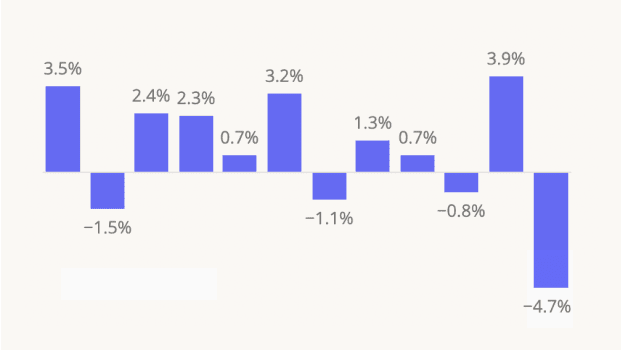Insights into the physical world anchored in location analytics
Article

Article
CAVA and sweetgreen Take to the SuburbsThe Kroger Co, is a leading player in the grocery store space, operating its epon lorem ipsum dolor sit amet, consectetur adipiscing elit, sed do eiusmod tempor incididunt ut labore et dolore magna aliqua. Ut enim ad minim veniam, quis nostrud exercitation ullamco laboris nisi ut aliquip ex ea commodo consequat. Duis aute irure dolor in reprehenderit in voluptate velit esse cillum dolore eu
Apr 25, 2025
3 minutes

INSIDER
Report
Domestic Migration in 2025: The Great SlowdownDive into the data to explore domestic migration patterns over the past four years – and uncover states and metro areas emerging as relocation hotspots in 2025.
April 25, 2025
6 minutes
Article
Article
The Impact of QSR Promotions in Q1 2025The Kroger Co, is a leading player in the grocery store space, operating its epon lorem ipsum dolor sit amet, consectetur adipiscing elit, sed do eiusmod tempor incididunt ut labore et dolore magna aliqua. Ut enim ad minim veniam, quis nostrud exercitation ullamco laboris nisi ut aliquip ex ea commodo consequat. Duis aute irure dolor in reprehenderit in voluptate velit esse cillum dolore eu
Apr 24, 2025
3 minutes
Article
Article
Health-Centric Grocers Lead the Way The Kroger Co, is a leading player in the grocery store space, operating its epon lorem ipsum dolor sit amet, consectetur adipiscing elit, sed do eiusmod tempor incididunt ut labore et dolore magna aliqua. Ut enim ad minim veniam, quis nostrud exercitation ullamco laboris nisi ut aliquip ex ea commodo consequat. Duis aute irure dolor in reprehenderit in voluptate velit esse cillum dolore eu
Apr 23, 2025
3 minutes
Industry Trends
Year-Over-Year Visits to Grocery Stores by State
Article

Article
Sinners Fuels Movie Theater Momentum The Kroger Co, is a leading player in the grocery store space, operating its epon lorem ipsum dolor sit amet, consectetur adipiscing elit, sed do eiusmod tempor incididunt ut labore et dolore magna aliqua. Ut enim ad minim veniam, quis nostrud exercitation ullamco laboris nisi ut aliquip ex ea commodo consequat. Duis aute irure dolor in reprehenderit in voluptate velit esse cillum dolore eu
Apr 25, 2025
1 minute
Article

Article
CAVA and sweetgreen Take to the SuburbsThe Kroger Co, is a leading player in the grocery store space, operating its epon lorem ipsum dolor sit amet, consectetur adipiscing elit, sed do eiusmod tempor incididunt ut labore et dolore magna aliqua. Ut enim ad minim veniam, quis nostrud exercitation ullamco laboris nisi ut aliquip ex ea commodo consequat. Duis aute irure dolor in reprehenderit in voluptate velit esse cillum dolore eu
Apr 25, 2025
3 minutes
Article

Article
Sinners Fuels Movie Theater Momentum The Kroger Co, is a leading player in the grocery store space, operating its epon lorem ipsum dolor sit amet, consectetur adipiscing elit, sed do eiusmod tempor incididunt ut labore et dolore magna aliqua. Ut enim ad minim veniam, quis nostrud exercitation ullamco laboris nisi ut aliquip ex ea commodo consequat. Duis aute irure dolor in reprehenderit in voluptate velit esse cillum dolore eu
Apr 25, 2025
1 minute
Article

Article
The Impact of QSR Promotions in Q1 2025The Kroger Co, is a leading player in the grocery store space, operating its epon lorem ipsum dolor sit amet, consectetur adipiscing elit, sed do eiusmod tempor incididunt ut labore et dolore magna aliqua. Ut enim ad minim veniam, quis nostrud exercitation ullamco laboris nisi ut aliquip ex ea commodo consequat. Duis aute irure dolor in reprehenderit in voluptate velit esse cillum dolore eu
Apr 24, 2025
3 minutes
Article

Article
Health-Centric Grocers Lead the Way The Kroger Co, is a leading player in the grocery store space, operating its epon lorem ipsum dolor sit amet, consectetur adipiscing elit, sed do eiusmod tempor incididunt ut labore et dolore magna aliqua. Ut enim ad minim veniam, quis nostrud exercitation ullamco laboris nisi ut aliquip ex ea commodo consequat. Duis aute irure dolor in reprehenderit in voluptate velit esse cillum dolore eu
Apr 23, 2025
3 minutes

Latest

Article
Crafting a Goodbye: What Location Analytics Reveals About JOANN’s DepartureFollowing a second bankruptcy filing, JOANN recently announced a complete shutdown of its fleet. Using location analytics, we uncovered the foot traffic trends behind JOANN’s unraveling and pinpointed retailers that stand to gain from its exit from the arts and crafts space.
April 22, 2025
3 minutes

Article
What Visitation Data Reveals About Industrial Manufacturing Demand Ahead of TariffsVisitation data at manufacturing facilities can shed light on consumer demand and industrial output trends. We dove into the traffic data at a composite of manufacturing facilities across the United States to find out how the potential tariffs are impacting manufacturing output.
April 22, 2025
4 minutes

Executive Insights
All The Things I Think I Think About Retail Over The Last QuarterFind out all the thoughts Chris Walton has had about retail throughout Q1 2025. Which brands are thriving, which are poised for a turnaround, and who may be on the decline?
April 21, 2025
13 minutes

Article
McDonald’s & Chipotle Q1 2025 RecapMcDonald's and Chipotle are staying strong despite economic uncertainty. With Q1 2025 over, we looked at their visit trends and key strategies driving customer traffic.
April 21, 2025
3 minutes

Article
Location Intelligence On Display: A Look at Los Angeles's Top MuseumsLos Angeles boasts several world-class museums that educate and entertain local visitors and tourists alike. We dove into the data for several of LA’s top museums in order to examine the visitation patterns and demographics of museum goers in Los Angeles.
April 18, 2025
4 minutes

Article
3 Insights Into the Shopping Habits of Older Consumers Despite making up over 40% of American adults, Gen X and Baby Boomers are often overlooked by marketers in favor of Gen Z shoppers. We analyzed the latest data to better understand these frequently overlooked consumer segments.
April 17, 2025
4 minutes

Article
Placer 100 Index, March 2025 Recap – Which Chains Weathered the Storm? Foot traffic to the Placer 100 Index for Retail & Dining - the top-performing chains identified by the Placer.ai platform - stabilized in March 2025, with fitness and dining leading the way.
April 16, 2025
3 minutes

Article
The Post-Pandemic Retail Evolution: A look back on the last five yearsHalf a decade has passed since the onset of the COVID-19 pandemic, transforming the retail industry overnight. We took a look back at how some things have changed - and what's stayed the same.
April 15, 2025
10 minutes

Article
Orlando Theme Park Wars Heat Up Universal’s Epic Universe opens May 22. We analyzed foot traffic and demographics at Universal and Disney parks in Orlando to see how this major addition could impact visitor trends to these tourist destinations.
April 14, 2025
2 minutes

Article
Retail & Dining Q1 2025 Recap: Budget-Friendly Segments Shine With Q1 2025 behind us, we analyzed the performance of key retail and dining categories to understand how consumer sentiment is shaping visit trends across different segments.
April 14, 2025
4 minutes

Article
Albertsons Analysis: Stable Start to 2025Albertsons Companies, Inc. commands a significant share of the U.S. grocery market through a wide range of grocery banners. We dove into recent customer traffic and engagement metrics to discover what’s changed for the company – and what’s stayed the same – over the past few years.
April 11, 2025
4 minutes

Article
What Visitation Data Reveals About Consumer Behavior Ahead of Tariff ImplementationTariffs have the potential to impact everything from product pricing to in-store foot traffic. We took a look at how retail visits and consumer behavior shifted as tariffs were announced.
April 11, 2025
4 minutes
Retail




Article
Health-Centric Grocers Lead the Way We dive into the visit data for Sprouts Farmers Market and Natural Grocers to see how the two health-centric grocers are performing in Q1 2025.
April 23, 2025
3 minutes

Article
Crafting a Goodbye: What Location Analytics Reveals About JOANN’s DepartureFollowing a second bankruptcy filing, JOANN recently announced a complete shutdown of its fleet. Using location analytics, we uncovered the foot traffic trends behind JOANN’s unraveling and pinpointed retailers that stand to gain from its exit from the arts and crafts space.
April 22, 2025
3 minutes

Executive Insights
All The Things I Think I Think About Retail Over The Last QuarterFind out all the thoughts Chris Walton has had about retail throughout Q1 2025. Which brands are thriving, which are poised for a turnaround, and who may be on the decline?
April 21, 2025
13 minutes

Article
3 Insights Into the Shopping Habits of Older Consumers Despite making up over 40% of American adults, Gen X and Baby Boomers are often overlooked by marketers in favor of Gen Z shoppers. We analyzed the latest data to better understand these frequently overlooked consumer segments.
April 17, 2025
4 minutes
QSR




Article
The Impact of QSR Promotions in Q1 2025Using the latest location intelligence, we analyzed RBI, Yum! Brands, and other top QSRs, to explore their Q1 2025 performance and several promotions that had a significant foot traffic impact.
April 24, 2025
3 minutes

Executive Insights
All The Things I Think I Think About Retail Over The Last QuarterFind out all the thoughts Chris Walton has had about retail throughout Q1 2025. Which brands are thriving, which are poised for a turnaround, and who may be on the decline?
April 21, 2025
13 minutes

Article
McDonald’s & Chipotle Q1 2025 RecapMcDonald's and Chipotle are staying strong despite economic uncertainty. With Q1 2025 over, we looked at their visit trends and key strategies driving customer traffic.
April 21, 2025
3 minutes

Article
Placer 100 Index, March 2025 Recap – Which Chains Weathered the Storm? Foot traffic to the Placer 100 Index for Retail & Dining - the top-performing chains identified by the Placer.ai platform - stabilized in March 2025, with fitness and dining leading the way.
April 16, 2025
3 minutes




.png)
.png)

.png)
.png)












.svg)